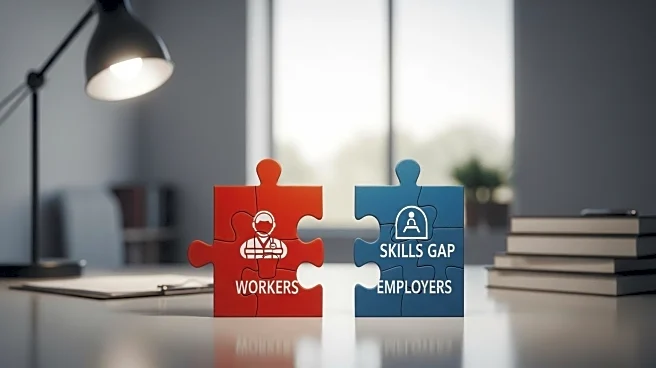What is the story about?
What's Happening?
A report from DeVry University has identified a growing 'silent standoff' between workers and employers regarding skills development. The report highlights a discrepancy between workers' confidence in their skills and employers' concerns about future workforce readiness. While 85% of workers believe their skills will keep them employable over the next five years, 69% of employers express concern about their workforce's preparedness for future changes. This gap has led to a sense of disengagement among workers and anxiety among employers. The report emphasizes the importance of bridging this gap through upskilling and reskilling initiatives, with a focus on soft skills such as critical thinking, communication, and adaptability.
Why It's Important?
The skills gap identified by DeVry University has significant implications for the U.S. labor market and economic competitiveness. As industries increasingly integrate technology and automation, the demand for new skill sets is rising. Employers' concerns about workforce readiness could hinder economic growth and innovation if not addressed. The emphasis on soft skills highlights a shift in employer priorities, reflecting the need for employees who can adapt to rapidly changing work environments. This situation presents both a challenge and an opportunity for educational institutions and policymakers to develop effective training programs that align with industry needs, ensuring that the workforce remains competitive in a global economy.
What's Next?
To address the skills gap, employers and educational institutions may need to collaborate more closely to design and implement effective upskilling and reskilling programs. This could involve increased investment in training initiatives and a reevaluation of current educational curricula to better align with industry demands. Employers might also need to reassess their strategies for employee development, ensuring that workers have access to the necessary resources and support to build relevant skills. As the economy continues to evolve, ongoing dialogue between stakeholders will be crucial to creating a sustainable and adaptable workforce.
Beyond the Headlines
The skills gap also raises ethical considerations regarding the responsibility of employers versus employees in skill development. As automation and AI reshape job roles, there is a growing debate about who should bear the cost and effort of reskilling. This dynamic could influence labor relations and employee satisfaction, potentially impacting retention rates and organizational culture. Additionally, the focus on soft skills underscores a broader cultural shift in the workplace, where emotional intelligence and adaptability are becoming as valued as technical expertise.















